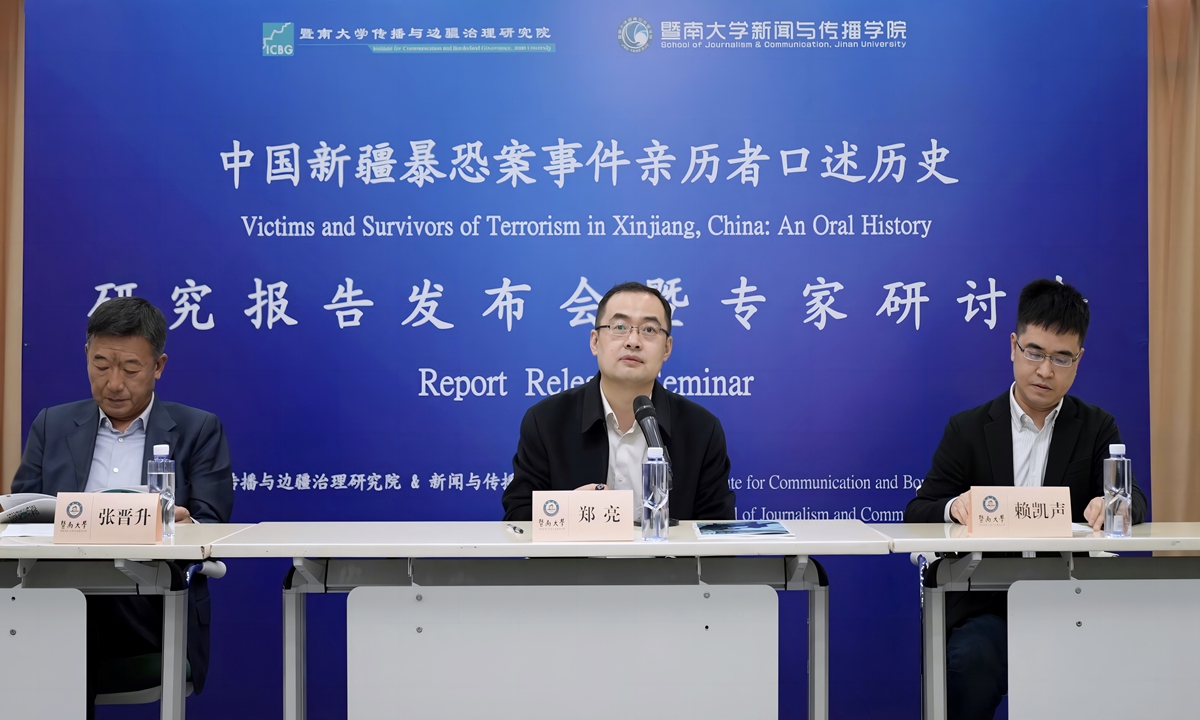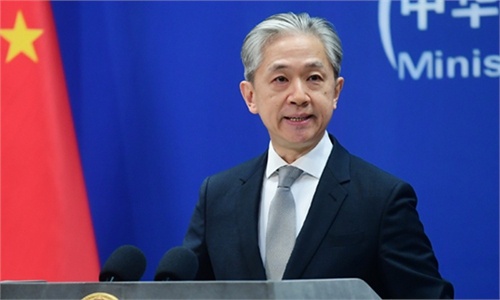Academic institute releases China's first oral history of victims and survivors of terrorism

The Institute for Communication and Borderland Governance of Jinan University held a seminar on January 18, 2024, during which researchers introduce the research project titled "Victims and Survivors of Terrorism in China: An Oral History".
An academic institute which is part of Jinan University of South China's Guangdong Province released on Thursday the first installment of the country's first oral history of victims and survivors of terrorism in China with the purpose to fill the research gap and let more know the stories of this special group and to get a more objective understanding of China's counter-terrorism efforts amid rumors spread by anti-China forces.
The Institute for Communication and Borderland Governance of Jinan University held a seminar on Thursday to release the report, during which researchers introduced that the research project titled "Victims and Survivors of Terrorism in China: An Oral History" began in 2021. So far, they have conducted interviews with over 60 witnesses of violent terrorist incidents happened in various places of Northwest China's Xinjiang Uygur Autonomous Region, including Hotan, Kashi, Turpan and Urumqi, collecting over one million words worth of written records and over 90 hours of audio and video materials.
Xinjiang region was once severely afflicted by terror attacks and this is why the project started by interviewing victims in the region. The report will also conclude stories of survivors of terror attacks in Kunming and Beijing, Zheng Liang, director of the institute, who initiated the project, told the Global Times.
The first part of the oral history report was released on Thursday, which included six survivors and relatives of victims talking about what happened to them and their beloved ones in a terror attack in Yecheng county of Kashi on February 28, 2012.
On that day, nine terrorists brutally attacked the pedestrians, shopkeepers, and other innocent bystanders in the Xingfu Road market, killing 13 and injuring 16 at the scene and two of the injured later died during emergency treatment. One terrorist was captured at the scene by the police, seven were shot dead, and one was wounded and later died.
The terrorists originally planned to attack the students from the nearby elementary and middle schools but then changed their plan after Turghunjan, an auxiliary police officer who was on duty found them suspicious. They hacked Turghunjan to the ground and started attacking pedestrians and people in the Xingfu Road market.
The Thursday report included an interview of Tursun Talip, father of Turghunja, who recalled that day with painful memories.
"When I arrived that day, people were already cleaning up the scene, but I could still see blood on the ground. I went back there the next afternoon, there remained some blood on the ground, and I was sitting there, looking at the blood and crying. All I had in my mind was the scene where my son was hacked to the ground. I could even hear him cry, 'Dad, Dad...'" Tursun revealed.
Tursun said that his son, who had been a hard-working person, was just doing his job that day but ended up brutally killed. "I want to ask those terrorists: 'Don't you cherish your own lives?' If the government allowed me to see these terrorists, I would tear them to pieces, which would not even ease my hatred."
Aside from Tursun, the first installment of the report shares the stories of five survivors of the terror attacks. In the afterword, researchers noted that "for most of the interviewees, recalling the horrific experience they had years ago was difficult. The interview always began after hours, if not days, of psychological struggle. There was a survivor who told us before the interview, 'I didn't want to talk about it, but I think it is quite necessary to let more people know what happened back then, so I chose to speak out.'"
Zheng said that what happened to these victims showed that terrorism victims are completely indiscriminate in terms of ethnicity and when terrorists inflict harm, they do not consider your ethnicity at all. It also reminds us to remain highly vigilant against the possible resurgence of terrorism and not to forget the constant threat it poses.
Zheng, born and grew up in Xinjiang, also mentioned the previous reports on terror attacks mainly focused on the causes of terrorism and violent incidents but there is a lack of in-depth interviews and reports on the victims. The trauma suffered by ordinary people in these terrorist incidents is also insufficiently addressed. And the absence of the voice from this group of people sometimes leads to attacks on China with some overseas organizations claiming that terrorism does not exist in China, adding that terror attacks are the result of oppression against ethnic minorities.
This narrative has been fabricated by anti-China forces with political purposes, portraying the perpetrators of these terrorist incidents as victims, selectively ignoring the real victims, according to Zheng, noting that the project is to speak up for the voiceless, to record history and protect the victims, and also provide historical data for the study of contemporary governance in the Xinjiang region.
Moreover, the project is to support China's counter-terrorism and de-radicalization efforts, making the international community aware that China, like other countries, has suffered from terrorism, and China's counter-terrorism efforts are justified and legitimate, Zheng noted.



